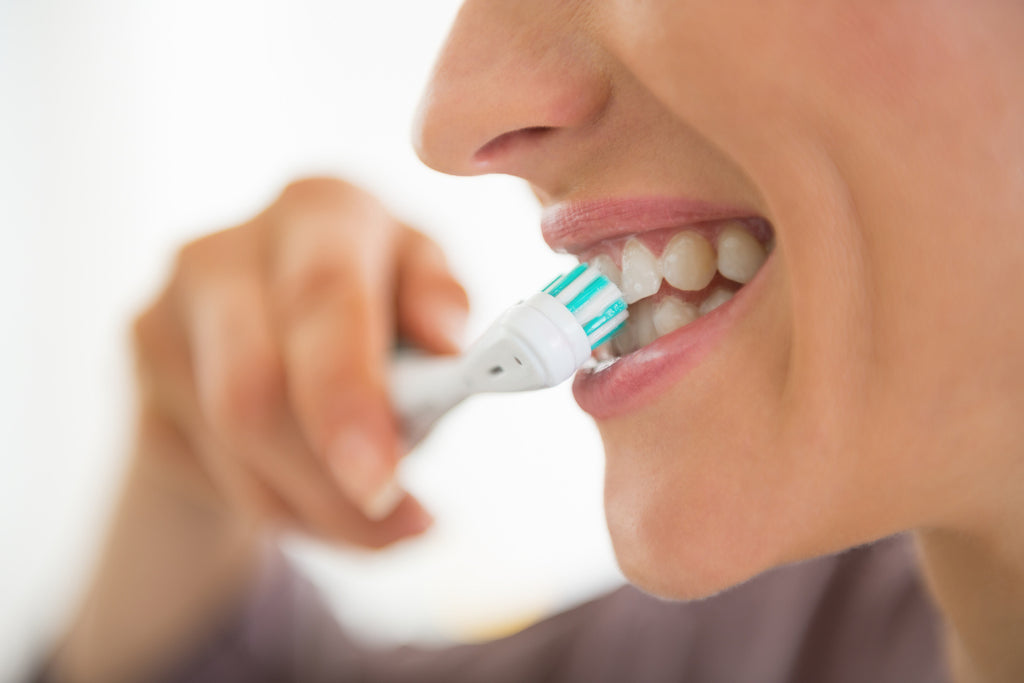If you haven't heard of the super-herb neem, it's about time you do! Native to the Indian subcontinent, neem, also known as Indian lilac, Azadirachta Indica, or ‘Neemba’ in Sanskrit has been used in Ayurvedic medicine, with traditional remedies dating back to at least 5000 years.
In fact it's not unusual to find the ancient neem tree in an Indian family's backyard or a common compound in a residential building, as traditional Indian households have been using the powerful herb in lotions, medicines, insecticides, hair care products, pest control, religious ceremonies and more since centuries!
With a 100+ biologically active compounds and its unique ability to treat a whole range of health issues, the neem tree, botanically classified as Azadirachta Indica truly lives up to its name - The Tree of Life.
Extracted from the seeds of the neem tree, neem oil is nature's gift to mankind. Incredibly bitter in taste with a pungent garlicky, sulfur-like smell, and varying in color from greenish brown, to yellowish brown to shades of red, the oil is host to a remarkable number of active ingredients, that offer powerful healing properties for many medical ailments.
Some of the top ingredients found in neem oil include vitamin E, nimbidin & nimbin compounds, carotenoids, linoleic acid, oleic acid, vitamin C, quercetin and the main compound azadirachtin, which is one of nature's most powerful insect repellents. These natural ingredients make neem oil a potent antifungal, antipyretic, antibacterial and anti-inflammatory making it a must-have addition in your medicine cabinet!
Now let's explore the top 20 amazing benefits of neem oil:
Neem Oil for Hair

There are costly branded hair oils that use neem leaf extract, but you'll find that you can get the exact same results with neem oil for hair and scalp care. Neem oil can improve all hair conditions from dry, thinning, frizzy hair to helping with hair loss, promoting hair growth and getting rid of lice. In fact if you've tried everything and nothing seems to work, you must give neem oil a try.
1. Neem Oil for Hair Loss
It's important to maintain and take care of your hair so that you can prevent hair ailments such as hair loss, dry itchy scalp, premature graying, dandruff and more. Conditioning the hair with neem oil can do wonders for your hair health and prevent hair loss.
How to use neem oil for hair loss:
1. Add to shampoo: Add a few drops of neem oil to your shampoo. Let sit for 10 minutes and wash off. Use daily or every alternate day and see the difference!
2. Intensive scalp treatment: Combine 1 tsp. of neem oil to 2 tsp. of a carrier oil also beneficial for hair such as coconut oil, almond oil or Emu Oil (excellent for hair loss!). Leave over-night or at least for a few hours. Apply weekly to rejuvenate your scalp and get hair as smooth as silk.
2. Neem Oil for Dandruff
Neem oil is commonly found in many anti-dandruff shampoos. Applying neem oil regularly can help scalp itching and dryness and being a natural anti-fungal and antibacterial, it can curb fungal and bacterial infections that can often cause or worsen dandruff. Neem oil also helps to restore the natural pH level of the scalp, important for dandruff control.
How to use neem oil for dandruff:
Scalp Treatment: Massage 2-3 tsp. of warm neem oil directly onto the scalp. Wash in 30 minutes. It is best to use the highest quality of neem oil such as cold-pressed neem oil for best results.
If you have a sensitive scalp combine neem oil with a carrier oil such as coconut or moringa oil (an excellent hair conditioner!).
3. Neem Oil for Dry Itchy Scalp
There's nothing more annoying than a dry, itchy scalp. Combining neem oil with powerful essential oils such as eucalyptus oil (an excellent anti-inflammatory), and peppermint oil (to provide soothing cooling relief) is a great way to nourish a dry scalp, curb itching and make your hair smell great!
How to use neem oil for dry itchy scalp:
Itch Relief: Combine 1 tsp. neem oil with 2-3 drops of eucalyptus oil, 2-3 drops of peppermint oil and 1 tbsp coconut or almond oil. Massage into the hair and scalp. Leave and wash after a few hours or leave overnight for best results.
4. Neem Oil for Frizzy Hair
Does your hair seem to get frizzy during the monsoon season or when you're out on the beach? Neem oil is great for those who live in high humidity conditions and get rough, frizzy hair as a result. Increased moisture in the air makes the hair absorb water and swell. Neem oil is great for combating frizzy hair because it has hydrophobic properties and is a natural water repellent. It forms a thin coating on the hair protecting your hair from the environment.
How to use neem oil for frizzy hair:
Frizzy Hair Conditioner: Add a few drops of neem oil to 1 tsp. of a carrier oil such as coconut oil and massage into the scalp. You can also add a few drops of your favorite essential oil to curb the smell of neem oil such as peppermint oil, or tea tree oil (another excellent essential oil for hair and scalp health). This will give the hair a nice shine and protect it from the elements.
5. Neem Oil for Split Ends
Split ends often happen when hair weakens and breaks at the end of the hair shaft. There can be many reasons why split ends occur such as harsh heat styling, damaging hair products, sunlight and more. If you suffer from split ends trimming your hair regularly is recommended. To control split ends apply a few drops of neem oil with a carrier oil like coconut oil to condition and moisturize the hair and make it more manageable.
6. Neem Oil for Lice
If you have head lice, there's nothing more annoying. Neem oil contains the active ingredient azadirachtin, nature's all-natural insecticide. Many commercially available lice sprays contain neem as it is incredibly powerful in treating head lice but the downside is those sprays usually contain toxic chemicals which can do more harm than good. Lice hate the smell of neem oil, so this home remedy below is an excellent natural treatment you can do at home to get rid of lice once and for all.
How to use neem oil for lice:
Head lice treatment: Massage 6-7 tsp. of warm neem oil into the hair. Cover with a shower cap or towel and leave overnight. The next morning comb through hair with a fine nit comb, to catch the eggs. If itching continues, repeat.
Neem Oil for Skin

Neem oil is laden with natural nutrients that are extremely beneficial for those who have eczema, psoriasis and dry, itchy skin. It's antibacterial and anti-fungal properties help to heal small cuts and wounds, alleviate acne symptoms and fight skin-related fungal infections. No wonder manufacturers take advantage of the benefits of neem oil and use it in the manufacturing of skin care products such as lotions, creams, soaps and even cosmetics!
7. Neem Oil for Dry Skin
Being hydrophobic (a natural water repellent), neem oil is a highly effective skin conditioner and is excellent to use on areas of the skin that are exposed and washed frequently and tend to be more dry, such as the face, hands and feet. Neem oil creates a thin barrier on top of the skin and locks moisture in, leaving skin smooth and supple.
Neem oil is also rich in Vitamin E and Essential Fatty Acids (EFAs), and research suggests that, "Because of its EFAs and vitamin E, neem oil penetrates deep within the skin to heal the minute cracks brought on by severe dryness."
How to use neem oil for dry skin:
Moisturizing skin conditioner: Having a pungent odor, it is best to mix neem oil with a carrier oil such as coconut oil or tamanu oil (an excellent skin conditioner), and even add a few drops of your favorite essential oil to please the senses. Massage onto dry areas of your skin, especially the soles of the feet and cracked heels and feel the difference!
8. Neem Oil for Skin Pigmentation
Have pigmented skin? Neem oil is excellent at reducing skin pigmentation caused by an over-production of melanin (the pigment that gives human skin its color). Neem oil can help lighten areas of the skin by regulating the secretion of melanin, and when used regularly, it reduces skin pigmentation, making the skin fairer.
How to use neem oil for skin pigmentation:
Skin spot treatment: For small areas take a ear bud soaked in a few drops of neem oil and apply directly on the pigmented areas of the skin. Test for sensitivity on the inner side of your wrist before using on exposed areas such as the face and neck.
9. Neem Oil for Eczema and Psoriasis
Both eczema and psoriasis are skin conditions that cannot be cured but only controlled. Neem oil can effectively control the inflammation and irritation caused by these conditions helping to alleviate redness, swelling and heal cuts, breaks and abrasions in the skin. Neem contains nimbidin & nimbin compounds, that have shown to have powerful anti-inflammatory properties.
Being rich in Vitamin E, neem oil creates a thin layer to protect the skin and reduce moisture loss and being a natural pain killer (analgesic), neem oil can provide immediate relieve from discomforting skin irritation. This can reduce itching and scratching and actually prevent further complications.
How to use neem oil for eczema and psoriasis:
1. Neem Bath: For eczema and other skin conditions it is best to use soap-free cleansers. Towards the end of your bath add some neem oil to your bath water (lukewarm only) and rinse your body. This will create a protective barrier on your skin locking in moisture and making the skin soft.
2. Neem Salve: For sensitive skin conditions, applying undiluted neem oil can actually irritate the skin more, so it is best to mix neem oil with a carrier oil such as jojoba oil or tamanu oil and massage lightly onto the affected areas.
10. Neem Oil for Acne
There's no doubt that using natural alternatives like neem oil and potent essential oils are far better than using chemically-ridden creams and face washes that can actually cause more irritation and dry out the skin, when it comes to treating acne. Neem oil hampers bacterial growth and being a natural anti-inflammatory it helps to reduce redness and swelling. Vitamin E in neem oil helps heal damaged skin, reducing acne related scarring.
How to use neem oil for acne:
Face Mask: Warm 1 tsp. of olive oil and add 10-12 drops of cold-pressed neem oil. Not all neem oils are created equal, some may be more refined and contain added solvents, so make sure the bottle mentions that it is 100% cold-pressed neem oil. Apply this blend on the face, especially on pimples and wash off in 1-2 hours. You can also add 1 drop of peppermint oil and 1 drop of eucalyptus oil (both natural anti-inflammatory and antiseptic agents) for best results.
11. Neem Oil for Fungal Infections
Neem is a powerful anti-fungal, and contains active ingredients that are highly effective to treat topical fungal infections such as ring worm, toe and nail fungus and athletes foot. Research suggests that "extracts from neem leaves and seeds" are "sufficient to destroy" several strains of fungi.
How to use neem oil for fungal infections:
1. Apply Directly: Soak a ear bud with a few drops of neem oil and apply to the affected areas three times daily.
2. Nail infection Treatment: Blend 2-3 drops of oregano oil with the same amount of neem oil. Oregano oil is rich in thymol, a powerful agent with excellent anti-fungal properties. Apply on the infected nails and itchy skin between toenails. Repeat three times a day until the infection subsides.
12. Neem Oil for Anti-Aging and Sun Protection
Skin exposed to harsh ultraviolet (UV) rays of the sun can get inflamed and damaged. UV rays can penetrate skin layers and cause harm to the delicate collagen layer under the skin, that can cause the skin to age prematurely. But that's not all. UV exposure also causes a release of free radicals in the skin, which in worse cases can lead to skin cancer.
Even after wearing protective clothing, hats and applying sunscreen lotion to protect the skin, sun exposure can occur. When this happens neem oil's anti-inflammatory and analgesic action can help reduce redness and burning and the natural antioxidants in the oil can defend against free radicals protecting skin from further damage.
A 2011 research article published by the Department of Biochemistry and Biotechnology at the Kwame Nkrumah University of Science and Technology (KNUST) stated that neem "stimulates collagen production, good for aging skin," and that the Vitamin E in neem "acts as a free radical scavenger, by hindering the oxidizing processes in the skin. It promotes soft and supple skin, helps in reducing old scars and promotes healing."
How to use neem oil for anti-aging and wrinkles:
Anti-wrinkle Oil: Combine a few drops of neem oil with moringa oil (Used for centuries as an anti-aging oil, it rejuvenates aging skin, improving the appearance of fine lines, wrinkles and sagging facial muscles). Apply on the face for a few hours and wash off or leave overnight to get the full benefits of neem oil.
Neem Oil for Teeth and Gums

Neem twigs have been used in India for centuries as all-natural toothbrushes. Chewing on a neem twig (with the outer bark removed), can prevent gum disease, reduce tooth decay and also whiten your pearls. You may not have a neem tree in your backyard but having neem oil in your medicine cabinet can also work wonders for your teeth and gum health!
13. Neem Oil for Healthy Gums
Neem oil has natural anti-bacterial properties that make it excellent for bleeding gums and to use to prevent gum inflammation like gingivitis. Before brushing, simply massage 1-2 drops of neem oil mixed with a carrier oil such as coconut oil for healthy, strong gums and improved oral health. Brushing with a gentle toothpaste is recommended.
14. Neem Oil for Teeth
There are many toothpastes and oral care products available in the market that contain neem as an active ingredient, and there's good reason why - it works! Neem oil helps in bacteria and plaque control and will keep your teeth strong and healthy.
How to use neem oil for teeth:
1. Add to Toothpaste: Add 2-3 drops of neem oil to a tiny amount of toothpaste on your brush. The neem oil will penetrate the gums and go in between the teeth reducing tooth decay. The taste of the toothpaste will also help curb the strong taste of neem oil.
2. Medicated Floss: Rub some neem oil on your floss before flossing. Again, this helps improve oral health as the antibacterial and medicinal properties of neem seep into your gums and teeth.
Neem Oil for Insects and Pests

Commercial insecticides and pesticides are full of toxic chemicals that can often do more harm than good. If you're looking for a natural way to control insects, pests and disease, there's nothing better than neem oil.
According to ScienceDirect, neem is "a storehouse of insecticidal azadirachtin, which possess antifeedant, growth disrupting and larvicidal properties against an array of agricultural insect pests." In fact, azadirachtin is neem's most powerful active ingredient and one of nature's most potent insecticides. More importantly, neem is sustainable and environmentally-friendly unlike most synthetic alternatives.
15. Neem Oil for Plants
Chemical pesticides and insecticides can leech into the environment and cause harm. Unlike its synthetic counterparts, neem oil is non-toxic and naturally degrades into the environment and does not cause harm to animals, birds, fish and other wildlife.
Neem oil, and particularly its active compound, azadirachtin, can kill insects at different stages, from the egg and larvae stage to full grown adult by disrupting their reproductive cycles. Neem oil works efficiently against over a hundred different insects like aphids, mites, white flies, beetles, ants, leaf miners, caterpillars and more. Also interestingly, neem oil only affects insects that suck or chew and does not harm beneficial bugs like earthworms, ladybugs, and bees.
How to use neem oil for plants:
Neem oil insecticide spray: In a 16oz. spray bottle filled with warm distilled water first add 1/2 a tbsp. of pure Castile soap (don't use detergents; Castile soap is easily found in natural food stores or online and is needed to dissolve the oil) and 1/2 a tsp. of cold-pressed neem oil (a little goes a long way) as this has a high level of azadirachtin. Shake to dissolve. Spray once a week for best results. To further enhance your insecticide add 10 drops of citronella essential oil, an all natural insect repellent, which will also make your garden smell great!
Note: Unlike chemical sprays that can have immediate but toxic effects, neem oil will not work overnight and will take a few days to show results. Be patient and the results will show!
16. Neem Oil for Powdery Mildew
Powdery mildew is a fungal disease that affects many plants and especially roses. Affected plants look like they've received a dusting of flour. To control and remove powdery mildew from rose bushes and other plants, add 1/2 tsp. of apple cider vinegar to the neem oil insecticide spray above. Being a natural fungicide, research shows that neem oil is highly effective against the fungus. Spray once a week.
17. Neem Oil for Mosquitoes
Neem oil is a much safer alternative to using harsh insect repellents and pesticides that contain DEET, which have questionable health concerns.
When it comes to repelling mosquitoes, especially those carrying malaria, (a mosquito-borne and spread life threatening infectious disease), research shows that, "Two percent neem oil mixed in coconut oil, when applied to the exposed body parts of human volunteers, provided complete protection for 12 h from the bites of all anopheline species." The study concluded that the "application of neem oil is safe and can be used for protection from malaria in endemic countries."
18. Neem Oil for Bed Bugs
If you've ever had bed bugs, you know that there's nothing worse than your home being infested by these blood-sucking pests. The United States Environmental Protection Agency (EPA) has deemed that cold-pressed neem oil "is the only biochemical pesticide registered for use against bed bugs." In fact results have shown that neem oil can help control bed bug eggs, nymphs and adults.
How to use neem oil for bed bugs:
Bed Bug Spray: In a 16oz. spray bottle filled with water first add 1 tbsp. of pure Castile soap (easily available in natural food stores or online, and required to dissolve neem oil) and 4-5 tsp. of cold-pressed neem oil (The EPA recommends a 5.5% concentration level of neem oil for residential use). Shake to dissolve and add a few drops of an essential oil such as clove leaf essential oil, an effective bed bug repellent.
Spray your bed mattress, sheets, headboard, underneath the bed and small crevices where the annoying pests can hide. Use thrice a day for the first three days and then thrice a day, every alternate day, for at least 3 weeks to ensure you have eradicated the infestation.
Neem Oil for Pets

The benefits of neem oil are not just limited to humans! When your dog or cat suffers from parasites and mites and you want to turn to a natural alternative rather than an off-the-counter toxic product, choose neem oil. Neem oil is a safe alternative to synthetic products and can be highly effective against mites, fleas and other parasites that can cause discomfort to your pet.
19. Neem Oil for Dogs
Neem oil can help manage mites, fleas, parasitic infections, and even topical skin conditions like atopic dermatitis (an inflammatory skin condition caused by environmental allergens, that causes severe itching). Research shows that neem is "beneficial for dogs with atopic dermatitis," and can also manage mites and help with intestinal parasites, fleas and ticks.
How to use neem oil for dogs:
1. Tick spray: In a vessel combine 2 cups of warm water with 1/2 tsp. mild soap (such as Castile soap) and mix vigorously. Slowly add 1 tsp. of neem oil and stir continuously until dissolved. Fill in a spray bottle and use immediately on the affected areas.
2. Add to shampoo: For skin conditions and parasites, you can also add neem oil to the shampoo you use to bathe your dog. Add 1/2 tsp. to 1 tsp. of neem oil to 1/2 a cup of shampoo and use once every 2 weeks. Leave for 15-20 minutes and rinse off. For ticks follow with the tick spray recipe above.
20. Neem Oil for Cats
You always have to be cautious when using any kind of products on cats as they are constantly grooming and licking themselves. This makes commercial pesticides particularly awful, as they are sure to ingest them. Cats are also sensitive to essential oils (especially tea tree oil) so even if a particular oil works well for dogs, it might do your cat more harm than good!
For parasitic infections in cats it is best to add a low concentration of neem oil to their shampoo as it can be easily rinsed out and there's a much lesser chance of cats ingesting it. For cats use 10 drops of neem oil to 1 tbsp. of shampoo. Leave for 10 minutes and rinse off. Repeat every fortnight.
How to Buy Neem Oil
There are many types of neem oil available in the market, and not all are created equal. That's why it's important to know which kind to buy to attain the best possible results. Natural, pure, 100% cold-pressed neem oil is the highest grade oil you can buy and is the only kind we choose to carry at Up-Nature. It contains at least 1900 ppm azadirachtin, and is extracted from neem seeds without the use of heat or chemicals making it retain all the essential nutrients, and resulting in a therapeutic grade high quality oil.
The oil cake left after processing the cold-pressed neem oil is then treated with solvents to produce a lower grade oil that is mostly used commercially to manufacture soaps, insecticides etc. We recommend following the recipes in this post that use cold-pressed neem oil, knowing that you're getting the best quality neem oil which will give you the best results.
Side Effects and Warnings
Essential oils and carrier oils like neem are natural but powerful. Some people may develop an allergic reaction to any oil so it's always best to try a little by doing a small skin patch test on your inner arm or leg (never your face or neck) to make sure you don't have an adverse reaction.
What to Look for When Buying Essential Oils or Carrier Oils
When buying essential oils or a carrier oil such as neem, make sure the bottle says 100% pure oil, and has the proper name of the species mentioned on the label of the bottle. Example for Neem: (Azadirachta Indica). If you see the word 'fragrance' it almost always means there are other additives.
Ideally it's always best to buy essential oils that are labeled as "Therapeutic grade," meaning they are free of toxins and chemicals and are unfiltered and undiluted.
Also beware of genetically modified ingredients and choose Non GMO essential oils and carrier oils.
Last Words
There is no fixed recipe when it comes to using essential oils and carrier oils and what might work for you might not work for someone else. Since we are all biochemically exclusive, it's best to experiment with a variety of essential oils and carrier oils, pay attention to your body, and find the "personal blends" that work most optimally for you.
Back to you! Have you discovered the benefits of neem oil yet? We'd love to hear from you!



Comments (0)
Back to Blog